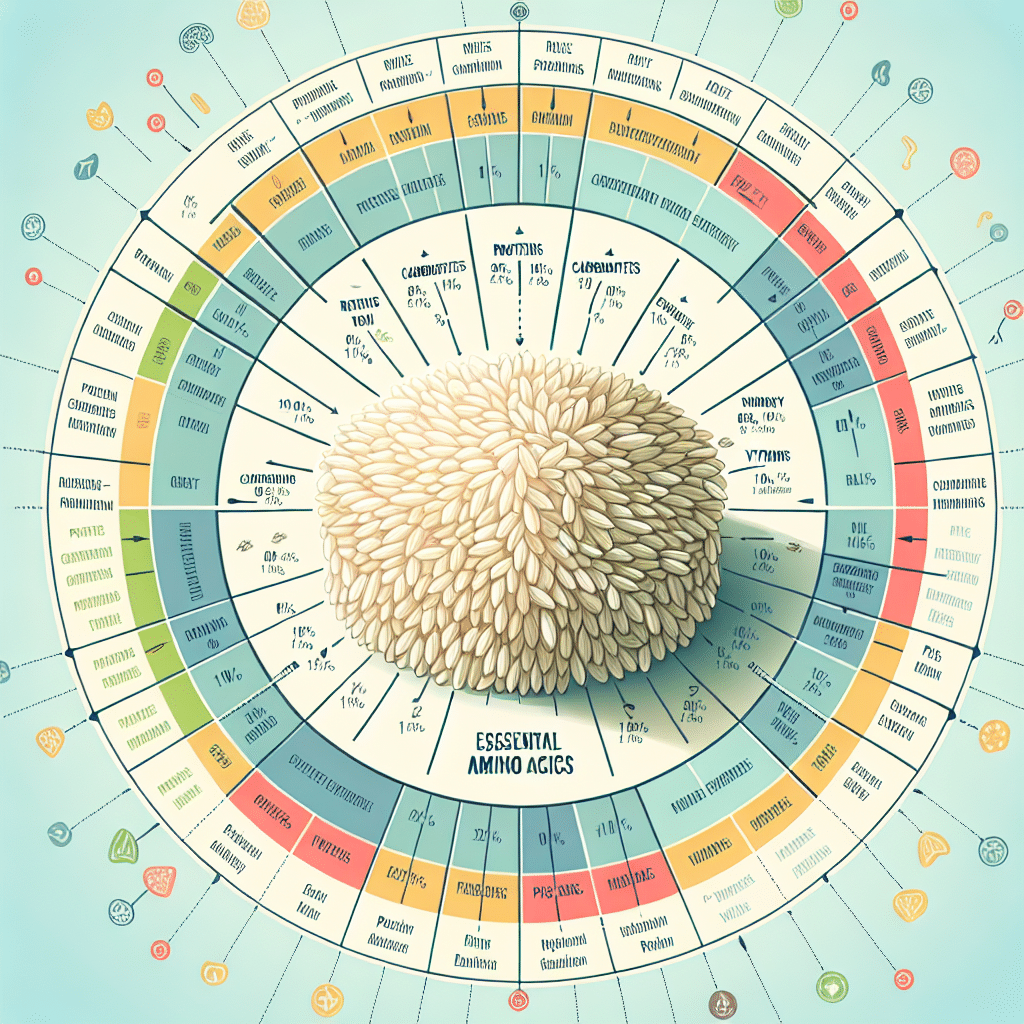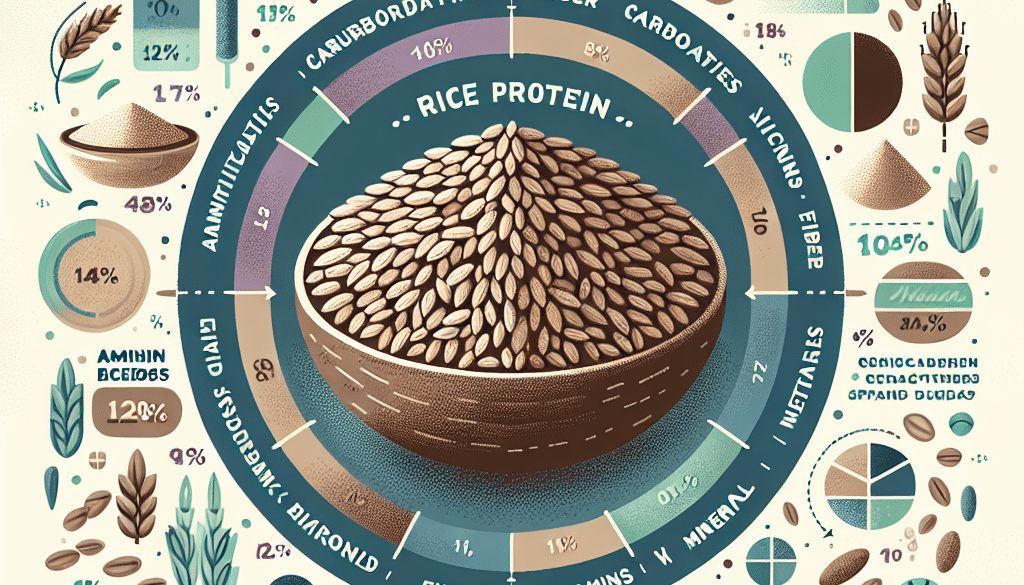What is Rice Protein: Nutritional Profile
-
Table of Contents
- Rice Protein: Unveiling Its Nutritional Profile and Benefits
- Understanding Rice Protein
- Nutritional Profile of Rice Protein
- Health Benefits of Rice Protein
- Comparing Rice Protein to Other Plant-Based Proteins
- Applications of Rice Protein
- Case Studies and Research on Rice Protein
- Choosing the Right Rice Protein
- Conclusion: The Rising Star of Plant-Based Proteins
- Discover ETprotein’s Premium Rice Protein Products
Rice Protein: Unveiling Its Nutritional Profile and Benefits

Protein is a vital macronutrient essential for the growth, repair, and maintenance of all body tissues. While animal-based proteins have traditionally dominated the market, plant-based proteins are gaining popularity due to health, environmental, and ethical considerations. Among these, rice protein has emerged as a highly sought-after alternative. This article delves into the nutritional profile of rice protein, its benefits, and its applications in various dietary contexts.
Understanding Rice Protein
Rice protein is a plant-based protein derived from brown, white, or whole grain rice. It is obtained through a process that separates carbohydrates from the protein fraction of the rice. The result is a protein-rich powder that can be incorporated into a variety of food products and supplements.
Nutritional Profile of Rice Protein
The nutritional profile of rice protein is impressive, making it a suitable protein source for many individuals, including those with dietary restrictions. Here’s a closer look at its nutritional composition:
- Protein Content: Rice protein typically contains about 80% protein by weight, providing all the essential amino acids required by the body.
- Amino Acid Profile: Although rice protein is lower in lysine compared to other protein sources, it is rich in sulfur-containing amino acids like cysteine and methionine.
- Fiber: Depending on the processing method, rice protein can retain some of the fiber from the whole grain, contributing to digestive health.
- Vitamins and Minerals: Rice protein may contain vitamins and minerals such as iron, calcium, and vitamin E, although the amounts can vary based on the rice source and processing.
- Low Allergenicity: Rice protein is hypoallergenic, making it a safe option for individuals with allergies to dairy, soy, or gluten.
Health Benefits of Rice Protein
Rice protein offers several health benefits that make it an attractive protein source for various dietary needs:
- Supports Muscle Growth: With a complete amino acid profile, rice protein supports muscle repair and growth, making it a viable option for athletes and bodybuilders.
- Weight Management: The high protein content can promote satiety, helping to control appetite and support weight management efforts.
- Heart Health: Being plant-based, rice protein can contribute to a lower risk of heart disease by reducing cholesterol levels and providing heart-healthy nutrients.
- Digestive Health: The fiber content in rice protein can aid in digestion and promote gut health.
- Diabetic-Friendly: Rice protein has a low glycemic index, making it suitable for individuals managing blood sugar levels.
Comparing Rice Protein to Other Plant-Based Proteins
When compared to other plant-based proteins such as pea, hemp, and soy, rice protein holds its own in terms of nutritional value and digestibility. Each protein source has its unique profile and benefits, and rice protein is often combined with other plant proteins to create a more balanced amino acid profile.
Applications of Rice Protein
Rice protein is versatile and can be used in various applications:
- Dietary Supplements: It is commonly found in protein powders, bars, and meal replacement shakes.
- Food and Beverage: Rice protein can be added to baked goods, cereals, and plant-based dairy alternatives.
- Sports Nutrition: Athletes may use rice protein supplements to support muscle recovery and growth.
- Special Diets: It is suitable for vegan, vegetarian, hypoallergenic, and gluten-free diets.
Case Studies and Research on Rice Protein
Several studies have highlighted the efficacy of rice protein in promoting muscle growth and recovery. For instance, a study published in the Journal of the International Society of Sports Nutrition found that rice protein isolate consumption post-resistance exercise decreased fat-mass and increased lean body mass, skeletal muscle hypertrophy, power, and strength comparable to whey protein isolate.
Choosing the Right Rice Protein
When selecting a rice protein product, consider the following factors:
- Protein Content: Look for products with a high percentage of protein per serving.
- Amino Acid Profile: Check if the product is fortified with additional amino acids, particularly lysine.
- Processing Method: Opt for products processed without harsh chemicals to preserve the nutritional integrity.
- Certifications: Choose products that are non-GMO, organic, and allergen-free if necessary.
Conclusion: The Rising Star of Plant-Based Proteins
Rice protein is a complete, hypoallergenic, and sustainable protein source that caters to a wide range of dietary needs. Its nutritional profile, health benefits, and versatility make it an excellent choice for those looking to incorporate more plant-based proteins into their diet. As the demand for plant-based nutrition continues to grow, rice protein is poised to become a staple in the health and wellness industry.
Discover ETprotein’s Premium Rice Protein Products
If you’re seeking high-quality rice protein, ETprotein offers a range of products that meet the highest standards. Their organic rice protein is characterized by a neutral taste, non-GMO, and allergen-free attributes, making it an ideal choice for various applications. Whether you’re a manufacturer, distributor, or consumer, ETprotein’s products are designed to meet your protein needs effectively.
About ETprotein:
ETprotein, a reputable protein Chinese factory manufacturer and supplier, is renowned for producing, stocking, exporting, and delivering the highest quality organic bulk vegan protein and plant proteins. They include Organic rice protein, clear rice protein, pea protein, clear pea protein, pumpkin seed protein, sunflower seed protein, mung bean protein, etc. Their offerings, characterized by a neutral taste, non-GMO, allergen-free attributes, cater to a diverse range of industries. They serve nutraceutical, pharmaceutical, cosmeceutical, veterinary, as well as food and beverage finished product distributors, traders, and manufacturers across Europe, USA, Canada, Australia, Thailand, Japan, Korea, Brazil, and Chile, among others.
ETprotein specialization includes exporting and delivering tailor-made protein powder and finished nutritional supplements. Their extensive product range covers sectors like Food and Beverage, Sports Nutrition, Weight Management, Dietary Supplements, Health and Wellness Products, and Infant Formula, ensuring comprehensive solutions to meet all your protein needs.
As a trusted company by leading global food and beverage brands and Fortune 500 companies, ETprotein reinforces China’s reputation in the global arena. For more information or to sample their products, please contact them and email sales(at)ETprotein.com today.












